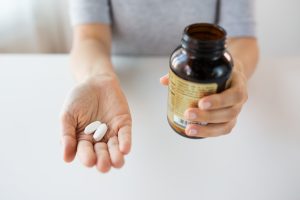Many people feel anxiety symptoms at some point but don’t realize how helpful seeking professional help can be. One standard treatment for patients experiencing anxiety is Zoloft — an oral medication prescribed by a physician or mental health therapist to facilitate a decrease in anxious thoughts and feelings over time.
This article discusses everything patients need to know about Zoloft for anxiety: what it is used for, its benefits and drawbacks, dosage instructions, and potential side effects.
Zoloft for Anxiety
Approximately 4% of the global population, or around 275 million, grapple with anxiety disorders. Most cases are classified as generalized anxiety, panic disorder, or phobia-related disorders.
One of the most productive treatment options for these conditions is a combination of psychotherapy and medication — with Zoloft (sertraline hydrochloride) being one of the most common drugs that healthcare providers prescribe.
Zoloft is an SSRI (selective serotonin reuptake inhibitor) that boosts serotonin levels in the brain. This neurotransmitter plays a vital role in mood regulation and has been linked to feelings of happiness.
What’s more, this medication has proved to be successful in soothing the symptoms of post-traumatic stress disorder (PTSD), obsessive-compulsive disorder (OCD), premenstrual dysphoric disorder (PMDD), and social anxiety disorder.
One of the advantages of taking Zoloft is that it takes effect relatively quickly — usually within four to six weeks, although individual results may vary. Many patients also experience fewer side effects than with other forms of treatment, such as benzodiazepines, making this an attractive option for those looking for a more gentle remedy. Some of the side effects of this medication include sexual dysfunction, weight gain, serotonin syndrome, and seizures, among others.
Zoloft for Children’s Anxiety
The Food and Drug Administration (FDA) has summarily declared Zoloft a viable treatment option for children with OCD aged 6 to 12.
It is essential to consider that the risks of using this drug regarding this age group are not entirely understood. Thus, a healthcare provider must weigh any potential dangers before administering them.
Additionally, doctors may prescribe this medication “off-label” for other conditions, such as panic disorder and GAD.
Compared to other medications, Zoloft has fewer known side effects in children and adolescents. Clinical trials have shown compelling evidence that combining Zoloft and cognitive behavioral therapy yields the most significant results in children diagnosed with anxiety and panic disorders.
For example, 80% of those receiving sertraline and cognitive behavioral therapy (CBT) showed substantial improvement after only 12 weeks. This makes the medication attractive for patients looking to manage severe anxiety symptoms in their children.
The only downside to this medication is the risk of suicidal thoughts in young patients. For this reason, it is vital to closely monitor any child taking Zoloft for signs of depression or suicidal thoughts. These prescription drugs must come with a black box warning for suicide ideation.
Zoloft and Morning Anxiety
Mornings can be challenging, but morning anxiety can make it even tougher for some people. Waking up to a racing heart and thoughts that won’t quiet down can feel overwhelming. While it is not a medical condition, morning anxiety can indicate an underlying disorder.
Symptoms of morning anxiety include:
- Racing heart
- Difficulty concentrating
- Feeling overwhelmed
- Fatigue
- Irritability
Although the source of morning anxiety may vary, studies have revealed that cortisol levels are highest in people experiencing high stress during their first waking hour. Moreover, consuming sugary foods or coffee in the morning can contribute to anxiety.
Fortunately, medications like Zoloft treat morning anxiety. By modulating cortisol levels and curbing symptoms of stress, these drugs make it easier to experience a peaceful state of mind.
An individual’s response to Zoloft can differ, so discussing any questions or concerns with a healthcare provider is essential. Additionally, simple changes such as exercising and eating a nutritious breakfast can help reduce morning anxiety.
Benefits of Zoloft
SSRIs like Zoloft can be very helpful in managing social anxiety disorder symptoms, making them an attractive option for many patients. Some of the advantages of taking these medications include the following.
Reduced Feelings of Anxiousness
Zoloft is a potent antidepressant that helps alleviate GAD symptoms by blocking serotonin reuptake. This increases concentrations of this essential neurotransmitter in the brain, decreasing distressing thoughts and feelings associated with such conditions.
As further confirmed by The Lancet Psychiatry, taking sertraline can produce a rapid decrease in signs of anxiety related to depression before any advancements in the symptoms of depression are seen.
Improved Sleep Quality
Individuals living with anxiety often struggle to achieve quality sleep. This can further worsen their symptoms due to increased levels of stress and exhaustion. Fortunately, Zoloft has improved both the duration and quality of sleep in those with GAD. As a result, these individuals can better cope with their condition with improved energy levels and a better outlook on life.
Long-term Relief
When taken for an extended period, Zoloft can bring about lasting relief from anxiety symptoms. This allows for more effective and efficient management of the condition. It also can reduce cravings for specific substances or activities that people with anxiety often use as coping mechanisms.
Although Zoloft has potential side effects, they are usually minor and mild. It is a fantastic option for patients who want long-term relief from anxiety symptoms.
Precautions When Taking Zoloft
Always consult a doctor before taking Zoloft or any other medication for anxiety. Disclosing all other medications, vitamins, and supplements is essential to avoid drug interactions.
Do not use monoamine oxidase inhibitors (MAOIs) with Zoloft, as the interactions could lead to serious health consequences. Further, those with a history of seizures or bipolar disorder should take extra caution when taking antidepressants like Zoloft.
Lastly, Zoloft and other medications used to treat anxiety cannot replace talk therapy, lifestyle changes, and other forms of professional treatment. As such, seeking assistance from a mental well-being expert is vital to address all aspects of the disorder.
Zoloft Doses
This medication is available as an oral solution and in 25, 50, and 100 mg tablets. The medication doses will vary depending on the individual’s specific needs, medical history, and response to the drug. Generally, individuals diagnosed with anxiety disorder start with a lower dose, like 25 mg, and gradually increase their dose over time.
When beginning treatment with Zoloft, being aware of potential negative effects like nausea and dizziness is essential. Start with a lower dose and work up as needed to prevent adverse reactions like serotonin syndrome.
If a person experiences severe adverse effects or no relief from anxiety symptoms while taking this medication, they should seek medical attention immediately.
Their doctor may adjust the dosage or recommend an alternative medication to manage their anxiety symptoms.
Best Time In The Day To Take Zoloft
Ultimately, the best period of the day to take Zoloft for anxiety will depend on what works best for each individual. Some people prefer taking their medication in the morning because it makes them more alert and focused throughout the day. Others may find that taking this medication at night is most beneficial, allowing them to experience better sleep quality. Taking it with food is also recommended to absorb the medicine better.
What Is the Right Zoloft Dose for Anxiety?
The proper Zoloft dose for anxiety can vary depending on the individual, so it is essential to consult a qualified medical practitioner when adjusting the dosage.
Generally, doctors recommend beginning with a low dose of 25 mg. They closely observe the patient’s response to the medication before deciding whether to adjust the dose.
Note that the maximum daily dose of Zoloft should never exceed 200 mg. Ramping up too quickly may put a person at risk for adverse side effects or overdoses.
When To Increase Zoloft Dose for Anxiety
Starting with a low dose and gradually boosting the dosage over time is a common approach to treating anxiety with Zoloft. While patients may be tempted to increase dosage levels, only a medical professional should decide when to change dosages. It’s necessary to adhere to a doctor’s instructions and closely monitor one’s progress.
Patients may not see improvement in symptoms at a specific dosage level, which may suggest that an increase could be beneficial. When considering whether to increase the Zoloft dose for anxiety, patients must do so in consultation with a doctor.
The doctor may also recommend increasing the dosage to find relief, but it is vital to remember that this should only be done under medical supervision.

When Does Zoloft Start Easing Anxiety?
It can take up to four weeks for Zoloft to start working for anxiety. During this time, the individual’s body needs to get used to the medication and adjust accordingly. It is not uncommon for people to experience side effects during this adjustment period as their body becomes accustomed to the drug.
Individuals must remain patient and continue to take their prescribed dosage as directed. Once the body has adapted to the medication, an individual should experience relief from anxiety symptoms.
It is also vital for individuals taking this medication to work closely with a mental well-being professional throughout their treatment process to monitor progress and ensure that all aspects of their disorder are being addressed.
Alternatives to Zoloft for Anxiety
Dealing with anxiety can be challenging; medication may be the best solution for some individuals. While Zoloft has been a commonly prescribed medication for anxiety, it may not work for everyone. Therefore, exploring alternative options may be necessary.
One alternative to Zoloft is cognitive behavioral therapy (CBT). This therapy identifies and changes negative thought patterns and behaviors contributing to anxiety. This approach is effective in reducing anxiety symptoms for many individuals.
Other alternatives are other antidepressants or anti-anxiety medications, such as Paxil, Lyrica, or Xanax. Zoloft works by altering the chemicals in the brain to boost mood and reduce anxious feelings.
Mindfulness meditation, yoga, and exercise are all-natural methods that can also help reduce the severity of anxiety symptoms without medications. Discovering a technique for each individual to manage their anxiousness efficiently is crucial.
How Does Zoloft Make You Feel?
Zoloft, when taken in the correct dose, can have a calming and relaxing effect on an individual. It helps to reduce intrusive thoughts and anxious feelings associated with anxiety. Generally, people taking Zoloft should feel more relaxed, better able to cope with stressors and notice improved sleep habits.
As everyone reacts to medications uniquely, it is essential to note that the effects of Zoloft can vary from person to person. To ensure optimum results and monitor potential side effects or shifts in mood, patients need to regularly check in with their doctor to ensure that their Zoloft dose is correct.
Does Zoloft Help With Anxiety?
Yes, Zoloft can be highly effective at helping with anxiety when prescribed by a doctor and monitored closely. Several studies have shown that Zoloft has been proven to reduce anxiety symptoms and help patients manage their disorders more effectively.
When individuals take the proper dosage, Zoloft can be an effective tool for managing anxiety. Although it may take some weeks to start seeing the desired effects, patients should wait out the period and stay in close contact with their doctor. Exploring CBT or lifestyle changes like exercise and mindfulness meditation can also help reduce anxiety symptoms.
How Long Does Zoloft Take To Start Treating Anxiety?
As mentioned above, it may take some patients several weeks to realize the drug’s beneficial effects on their condition. Many users report feeling improvements in their state as early as 2-3 weeks after first taking Zoloft, although individual results may vary.
Suppose the patient does not see complete relief from anxiety within six weeks of initiating treatment. In that case, they should consult a medical professional to determine if medication adjustments or other interventions are necessary. Such changes can be made to ensure optimal results and symptom management moving forward.
Can Increasing Zoloft Dose Cause Anxiety?
A patient might experience anxiety while increasing their dose of Zoloft. SSRIs like Zoloft are found to have a reported side effect of anxiety in some users. Due to the sudden intake or increased doses, the brain’s fluctuating serotonin levels can cause temporary anxiousness.
Consequently, people should seek medical advice if they notice any changes in their mental health while increasing the dosage of Zoloft. A doctor can assess an individual’s condition and determine a more suitable dose to help them manage anxiety symptoms better.
Zoloft For Generalized Anxiety Disorder
GAD is a mental health condition defined by excessive worrying based on perceived or imagined circumstances. Symptoms may include feeling overly tense, unable to relax, finding solace from restlessness, and having ongoing apprehension and dread.
Constant fear and uncertainty can accompany this disorder leading to immobilizing stress for those afflicted. GAD can often impact daily activities and prevent those living with it from partaking in their usual activities.
Zoloft is found to be effective in reducing symptoms of GAD. Backed by clinical studies, Zoloft is the primary course of action for those with GAD. After taking this medication, users may find relief from anxiety and intrusive thoughts and improved control over their emotions in stressful situations. This drug can help give individuals healthier coping mechanisms to make life easier.
Those struggling with GAD have greater chances of finding relief from this debilitating disorder with professional assistance. For optimal results, patients must adhere to the Zoloft regimen and frequently communicate with a doctor. This way, the healthcare professional can adjust the dosage of Zoloft where necessary, so patients experience their desired outcome.
Zoloft for Anxiety Reviews
Drugs.com states that 746 reviews of sertraline for anxiety and stress have resulted in an average rating of 7.2 out of 10, with 62% expressing a positive experience while 18% experienced adverse side effects. This clarifies that Zoloft can effectively manage anxiety symptoms, but individual results may vary.
Ultimately, check with a doctor before taking any medicine. With their expertise and knowledge, they can best evaluate an individual’s condition and provide the most appropriate treatment plan to find the right solution for each patient — ultimately leading to improved well-being and quality of life.
When To See a Doctor
Seek medical attention from a doctor if Zoloft has not been effective or you are experiencing adverse effects. They can customize a course of treatment to ensure your mental and physical health.
To take it one step further, consulting with a mental well-being specialist such as a psychiatrist or therapist may be helpful for anyone experiencing anxiety symptoms. Reaching out to professionals may assist in forming strategies to help cope with stressful situations and develop better strategies for long-term mental well-being.
Read Also: All You Need to Know About Zoloft Withdrawal
Frequently Asked Questions
Zoloft is a widely prescribed antidepressant that has proven effective in treating anxiety disorders and major depressive disorder, among other mental health conditions. The drug’s active ingredient, sertraline hydrochloride, works by altering how certain chemicals in the brain function, which can diminish the symptoms of anxiety and depression.
Nevertheless, much like other prescribed drugs, it is imperative to collaborate with a healthcare professional to decide if Zoloft will meet the patient’s particular needs.
When treating anxiety with Zoloft, the dosage may need to be increased. This is only recommended when the initial therapy has not had positive effects. If a patient is considering changing a medication regimen, speaking with their healthcare provider is essential to ensure it is safe and appropriate.
Remember that the decision to alter a patient’s current dosage should only be made with the input of a qualified medical professional — as doing so without their advice can have severe health-related consequences. We strongly advise against self-medicating.
As mentioned before, Zoloft is effective in treating anxiety. It has also been proven to effectively reduce the tell-tale symptoms of attention-deficit hyperactivity disorder (ADHD), such as impulsivity, restlessness, and difficulty concentrating.
A general practitioner or specialist can help determine if Zoloft is the right choice for treating ADHD, and they will be able to guide what dosage may best achieve successful outcomes.
There is a possibility that Zoloft may cause increased anxiety, especially at higher dosages. Patients should monitor their mental state when taking Zoloft and contact their physician immediately if they experience any significant increase in anxiety or panic attacks.
It is also cogent to note that other side effects, such as headaches, nausea, dry mouth, and insomnia, are associated with the drug.
As with any other medication, Zoloft has both risks and benefits. Alternatively, it can be an effective treatment in alleviating anxiety symptoms.
Conversely, any side effects associated with the drug should be strictly monitored and reported to a medical practitioner if they worsen or persist.





